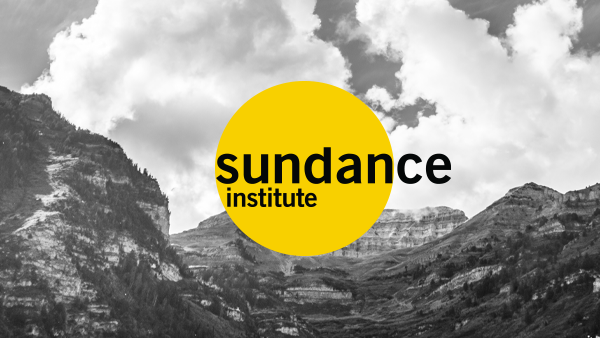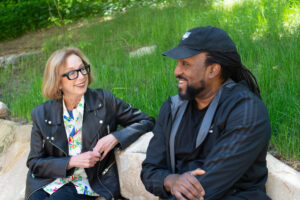Zan McQuade
The group of scientists and filmmakers speaking at the Discovery Panel at Filmmaker Lodge seemed to want to discuss nothing but dinosaurs. Metaphorically speaking, and otherwise.
Moderator Joe Palca of NPR led the discussion with Harvard physics professor Peter Galison, paleontologist Paul Sereno, filmmaker Braden King, neuroscientist Darcy Kelley, and filmmaker Diane Bell, whose film Obselidia was the winner of the Alfred P. Sloan Foundation Award at this year’s Festival (the panel itself was supported by the Foundation).
The conversation began with the topic of Bell’s film: obsolescence. A short clip from the film was screened, during which one of the characters says “Do you think that in the face of mass extinction people will change the way they live?”
Essentially, unless we change, will we become dinosaurs?
The panelists took up the topic of the film, a how both science and film must address issues of obsolescence. Sereno mentioned the pace of the obsolescence of technology, how “something is obsolete before we even let the dust settle on it.” Bell agreed, talking about her “dinosaur” of a laptop purchased two years ago.
The intersection of film and science is a place of magic for the panelists, a place where there is a potential to stave off extinction. Darcy Kelley noted that “the vision of the world of people is less romantic than it could be because they don’t have the romance of science” and that we’re on “a quest to bring the world of science into the creative world.”
Science itself seems to be making its own steps forward into other disciplines simply through the process of discovery. Bell mentioned that she had studied philosophy, and that the issues that were once philosophical are now scientific.
Galison agreed, adding that there should be “an organic connection between the stories we want to tell and science.” Global warming, privacy: “These are political but they are also scientific questions. These are issues that govern our lives.”
Braden King doesn’t see the intersection as a conflict, but rather “spokes emanating from the same hub.” When you take math out to its furthest end, he says, it becomes aesthetic. This is all a way of approaching what King calls “the mystery.”
Then King gave the quote I loved best, the quote I’ve repeated to everyone I’ve talked to about the panel since. “The film or the song or the painting isn’t the thing,” said King, adding that it’s the medium to get at the mystery. Film, to King, is “a piece of fabric you can drape over an unseeable thing to give it form.”
This is something we should all be printing on t-shirts.
Sereno talked about digging for dinosaur fossils in the desert, and how the process of discovery in filmmaking is a similar process. “Filmmaking is about imagination. It’s about trying to imagine a drifting continent. Science is fundamentally about imagining what you cannot see.”
The antidote to obsolescence is sustainability. Galison: “Sustaining characters and sustaining themes is where science and filmmaking have a lot in common.” Each has “a sustained way of reasoning the world.”
King then wondered: “What is the sustainable business model? How are we going to survive?” He attempted an answer himself: “We turn to drama as a way of figuring ourselves out.” If the filmmaker can take you on a “true and sincere journey” that somehow comes out of some internal conflict of the director, if you “have a truly nourishing interaction with the audience,” you can sustain a business.
Bell sees technology — in spite of its rapid progress of obsolescence — as a boon to the survival of both film and science: “The means of production have never been more accessible. It’s an exciting time to be an independent filmmaker because of technology.” The hope, in the end, is that obsolscence can be avoided through the discovery of new ways of looking at things, through changing the way we live, lest we all become dinosaurs.




